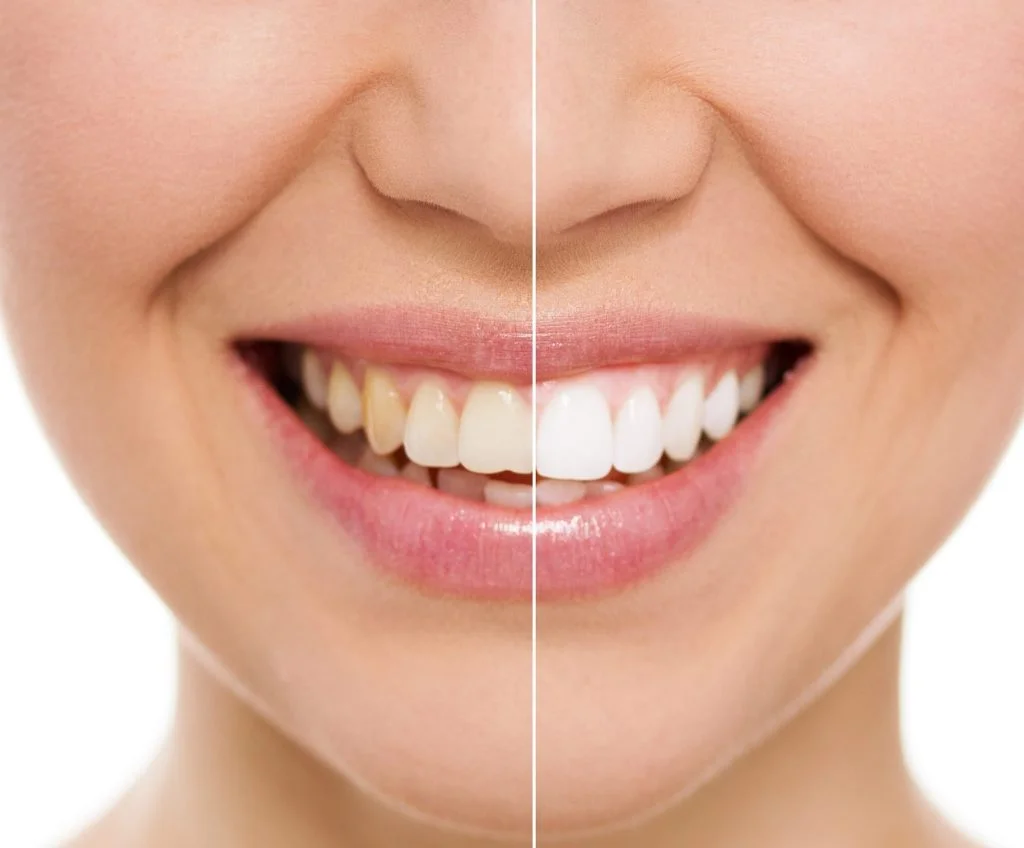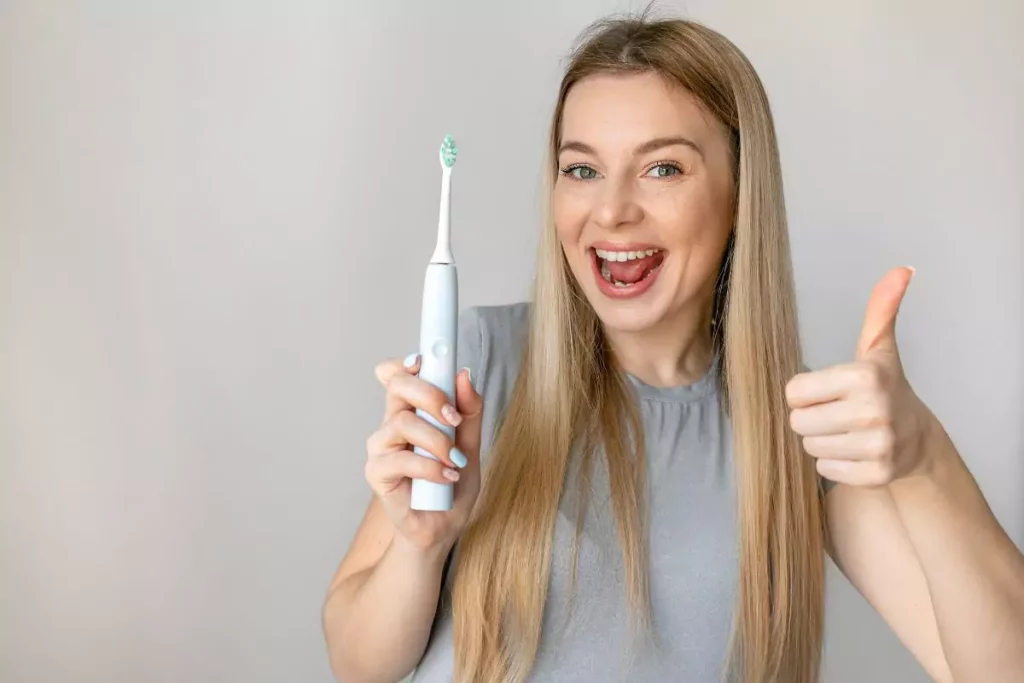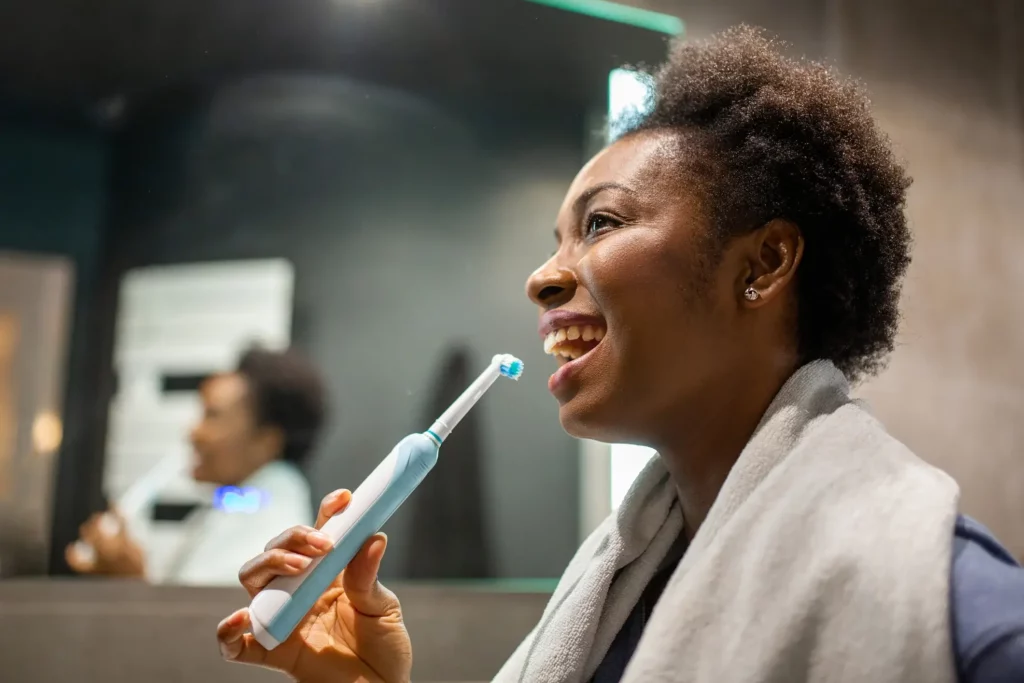Teeth whitening is a popular practice to improve the appearance of your smile, but many people wonder if it is really safe. Whitening methods include over-the-counter products, professional treatments in dental offices, and home remedies, all designed to lighten both the surface and deep stains on your teeth. However, while teeth whitening can offer visible results, the safety of each method depends on factors such as the concentration of the whitening agents, frequency of use, and individual tooth sensitivity.
It is important to understand the possible side effects before beginning a whitening treatment. Tooth sensitivity and gum irritation are common effects that, while temporary, can be bothersome for some people. For this reason, consulting a dentist before beginning any whitening process is the best way to ensure safe and effective results, tailored to your needs.
How Does Teeth Whitening Work?
Teeth whitening is an aesthetic dental procedure that reduces stains on the teeth and gives the teeth a whiter and brighter shade. Some oral health professionals consider that this is not a simple treatment.
There are different ways to whiten teeth:
1. Adhesive strips or gels are used to do the procedure at home. They do not require a prescription from a health professional, and they help to whiten teeth and remove stains.
2. Various brands of toothpaste, floss, and mouthwash offer whitening benefits and work differently than the chemical products listed above.
3. You can also resort to professional whitening. The dentist uses products that contain hydrogen peroxide (hydrogen peroxide) or carbamide peroxide. These procedures provide very similar, longer-lasting results in less time.
They may require a single session or a few office visits to achieve the desired result. In some cases, the dentist prescribes additional supervised home whitening therapies to complement the cosmetic procedure.
Changes from the whitening process are likely to be temporary and will disappear after discontinuing the use of the products.
Is it Safe to Whiten Teeth?
Teeth whitening, although effective in lightening stains, can have side effects, especially when used excessively or without professional supervision. It is essential to be aware of the potential consequences of these treatments before undergoing them.
Whitening products such as toothpastes, mouthwashes and dental floss often contain abrasives that, while exfoliating the tooth surface to remove stains, can also wear away enamel if used frequently. In addition, many over-the-counter products such as whitening strips and gels can damage the enamel and increase tooth sensitivity, especially with prolonged use without professional advice. The increasing availability of these products on the market has driven their use without sufficient information about the risks, reinforcing the importance of a prior consultation with the dentist to ensure a safe and effective treatment.
Are Whitening Strips Bad for Your Teeth?
Regarding the chemical products used in aesthetic dental procedures, research indicates that hydrogen peroxide damages the proteins in the dentin layer of the teeth. Dentin is a hard tissue that lies below the enamel surface.
Kelly Keenan, an associate professor at Stockton University in New Jersey, conducted research (2019) on whitening strips and found that hydrogen peroxide, a key ingredient in the product, damages dentin. Peroxide can permeate the enamel and seep into the dentin, the middle layer of the tooth, where about 95% of the collagen protein is found. It fragments when it comes into contact with hydrogen peroxide.
No information is yet available on this effect as to whether the damage is permanent or reversible.
Whitening and Tooth Sensitivity
Whitening and tooth sensitivity whitening products have a number of side effects, including damage to the tooth enamel, gum irritation, and increased sensitivity, among others.
Feeling discomfort (sensitivity) when consuming hot or cold foods or drinks is the most common side effect of an excessive whitening procedure. Some of these side effects are long-lasting and the damage to tooth enamel is permanent and irreversible.
High sensitivity to foods with different temperatures (hot/cold) is a sign that something has gone out of the proper range. It can be a result of application time, peroxide concentration, cracks and cavities, or defective restorations.
What People Should not Assume Dental Whitening?
People who have dental sensitivity, stomatitis, gum problems, or other oral pathologies should not undertake dental whitening treatment because the side effects of the procedure can be of variable severity.
In addition, the products used in whitening can lead to burns of the gingival tissue and if they reach the interior tissue, the death of the tooth.
How Often can Teeth Whitening be Done?
Whitening has a limit and if it is exceeded, the hydrogen peroxide will break down the proteins in the enamel, generating changes in the structure of the tooth.
The process stabilizes at a certain moment; to identify when the point has been reached, dentists use color guides to verify the progress of the whitening, based on the initial tone of the patient, and determine when to end the procedure. It is recommended to do it no more than once a year.
What is the Population Most Vulnerable to the Side Effects of Teeth Whitening?
The population with the highest level of vulnerability to the side effects of teeth whitening are young people because their teeth are more permeable. Typical of this stage of life, they seek a better physical appearance and bright white smiles, but they are not sufficiently informed about the side effects of teeth whitening.
Teeth whitening can be an effective way to enhance the appearance of your smile, but it requires careful consideration and, ideally, professional guidance to ensure safety. While there are various options available, from at-home products to professional treatments, each method has potential side effects, such as tooth sensitivity and gum irritation, which vary in severity.
Regular dental consultations are essential for choosing the most suitable whitening approach for each individual and avoiding excessive or incorrect use of whitening products that could harm the enamel. With appropriate precautions and guidance, teeth whitening can be safely incorporated into an oral care routine, offering brighter smiles without compromising dental health.
Frequently Asked Questions
Can teeth whitening damage teeth?
Yes, it can damage teeth. Bleaching agents can wear down enamel and increase tooth sensitivity, especially if used incorrectly or in excess.
How does tooth whitening work?
Tooth whitening works by using agents such as hydrogen peroxide or carbamide, which lighten tooth stains to improve the whiteness of teeth. It can be performed at home or in a dental clinic with different techniques and concentrations of whitening agents.
Teeth whitening options
Options include at-home whitening kits such as strips and gels, whitening pastes, and professional procedures performed by dentists, which offer faster and longer-lasting results.
Side effects and other considerations
The most common side effects are tooth sensitivity and gum irritation. It is crucial to perform these procedures under the supervision of a dentist to minimise risks and to assess the suitability of the treatment for the individual’s dental health.
Why is tooth enamel important?
Enamel is the protective outer layer of teeth, resistant to decay and wear. Maintaining healthy enamel is essential to prevent dental problems and maintain the structural and aesthetic integrity of teeth.
Share:
References
1. Clinic, C. (2024, 16 octubre). Are Teeth Whiteners Safe and Worth Trying? Cleveland Clinic. https://health.clevelandclinic.org/is-teeth-whitening-safe
2. Infosalus, & Infosalus. (s. f.). El lado oscuro del blanqueamiento dental. infosalus.com. https://www.infosalus.com/estetica/noticia-lado-oscuro-blanqueamiento-dental-20150318092359.html
3. Leticia, Q. V. D., Andrea, M. S. P., Leticia, Q. V. D., & Andrea, M. S. P. (s. f.). Efecto abrasivo de dentífricos clareadores con carbón activado. Revisión de la literatura. scielo.senescyt.gob.ec.
4. Teeth whitening. (s. f.). MouthHealthy – Oral Health Information From The ADA. https://www.mouthhealthy.org/all-topics-a-z/teeth-whitening
5. Yetman, D. (2021, 4 febrero). Do teeth whitening strips work? Healthline. https://www.healthline.com/health/do-whitening-strips-work
-
Nayibe Cubillos M. [Author]
Pharmaceutical Chemestry |Pharmaceutical Process Management | Pharmaceutical Care | Pharmaceutical Services Audit | Pharmaceutical Services Process Consulting | Content Project Manager | SEO Knowledge | Content Writer | Leadership | Scrum Master
View all posts
A healthcare writer with a solid background in pharmaceutical chemistry and a thorough understanding of Colombian regulatory processes and comprehensive sector management, she has significant experience coordinating and leading multidisciplina...


















